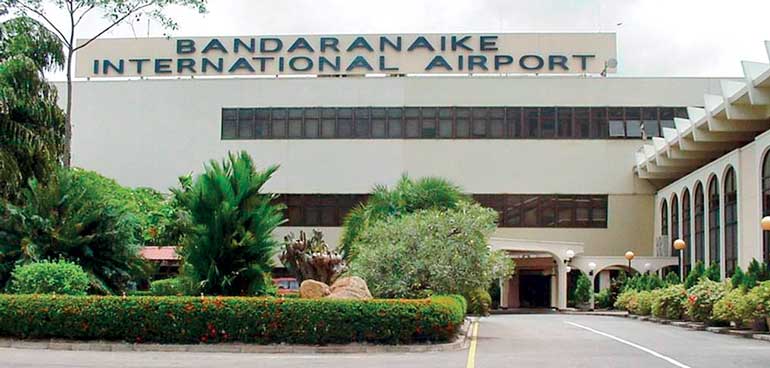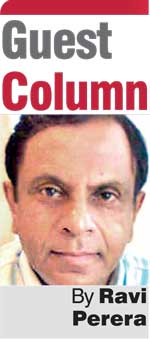Sunday Feb 15, 2026
Sunday Feb 15, 2026
Saturday, 23 July 2016 00:00 - - {{hitsCtrl.values.hits}}
 A classic example of our cultural predictability is explicit in the saga behind the naming of Sri Lanka’s only international airport
A classic example of our cultural predictability is explicit in the saga behind the naming of Sri Lanka’s only international airport
It will not be wrong to say that we are a country in a permanent state of crisis, but one that no one can fully explain. Saddled with a Constitution that is damned all around, an economy barely moving, simmering racial and other social tensions, leaders only distinguished by their mediocrity, primary institutions which have lost all credibility; a gloom, peculiar to a specific set of circumstances, holds the nation firmly in its grip.
Undoubtedly, we are prisoners of our own minds and creatures of habit. Our perceptions are coloured and therefore our response to any stimuli follows a pattern, culture specific and predictable.
On the other hand, it is a truism that most human progress has come from persons beyond the pale; from those who break with the system, challenge our certainties, and react differently. Little good has come from those who only follow; obedient to social expectations, adhere to whatever is endorsed by the crowd, worshipping the totems of the era, embracing the ambitions of the loudest.
Ours is a society with little incentive for outside the box thinking, in our social discourse as well as primary values the leaning being towards conformity and adherence. We have been rice farmers for millennia, and, there are no better ways of agricultural organisation for us. In our collective imagination the village idyllic reigns as the supreme picture of bucolic bliss; lush rice fields swaying to the gentle breeze, small wattle and daub houses of the village folk, of extremely modest means; but content, their spiritual needs more than adequately met by the temple, welcoming, gentle; the people; good, loyal to the king, brave and selfless.
Of course, the truth is very different, experience tells otherwise. From the times of Robert Knox more objective eyes have noted the indigent conditions of the natives. There is no better introduction to the grim realities of lives under primitive economics, in the margins of social relevance, than that riveting Leonard Woolf story of a village in the jungle. They were desperate characters; leading short and brutish lives of no joy. When it came, the draw of the big city was irresistible; Colombo was the only way to advance, to get into professions, to work in an office, to enter a larger world. Today in the global scale even Colombo is unsatisfactory, if you want to make real money, get a meaningful education, and lead a comfortable life – head to Katunayake straight away!
Naming of Sri Lanka’s international airport
It is worth a departure from the narration, to examine a classic example of our cultural predictability, so explicit in the saga behind the naming of Sri Lanka’s only international airport. During WW2 known as RAF Station Negombo, when the airport was handed over to the Royal Ceylon Air Force, it was renamed Katunayake Airport. In 1970 developed with Canadian aid into an international airport it became Bandaranaike International Airport – after S.W.R.D. Bandaranaike; his widow Sirimavo Bandaranaike was Prime Minister then! In 1977 when the UNP swept into power the name changed once again to Katunayake International Airport. Nearly 20 years later, on S.W.R.D.’s daughter Chandrika Bandaranaike becoming President, we went back to Bandaranaike International Airport! There is no embarrassment when elected leaders name public projects after them or their near and dear ones!
Going by the scale and the traffic of major international airports in our region, (which boasts stars like Singapore, Kuala Lumpur, Bangkok, Mumbai, New Delhi among several other busy airports) ours’ is one of the smallest and least busy airports. Whatever the airport’s present name, it is the main point of exit for the millions of Sri Lankans who go forth in search of a better life.
These are truths we will not face. Instead, it is the misty past we praise, we were a granary to the trading world, sophisticated investors, shrewd in the business of import and export; justice reigned in the land – extended even to the animals, and kings were strong and wise. (Literacy or the lack of it, hardly an issue). The Romans of today do not want to build another Roman Empire. There is no more empire building for the English either, no more absolutist kings; they have moved on, accepted the realities of the modern age. Not so for us. Oh, when does our next king appear?
Our leadership culture looks for certain criteria, “good” family, “good” school, and may be also of a devout nature perhaps? In our collective wisdom, however inexact the definitions, these qualities are said to guarantee good leaders. For nearly 70 years since independence, such leaders have led us. To say the least, it has been an extremely bumpy ride and the road ahead bound to be no less rough and even more uncertain.
Why we stay inside the mental box is not determined by reason.
State institutions and higher education
Most State institutions, especially when they venture into commercial activity, are unprofitable, eventually turning into white elephants with disastrous consequences to the whole economy. This, despite having the privilege of setting the rules of the game and then competing too! All the inherent advantages they enjoy notwithstanding, State institutions soon lose their way, eventually becoming only places to which politicians can freely appoint their kith and kin. But most Sri Lankans don’t see these that way, viewing State run institutions as sacred, morally superior. They are in a box.
Higher education is another noticeable blind spot for many. Almost all the best universities in the world are privately run; but we cannot have such things here. It is commonly said that good things are no cheap and cheap things are no good. Gradually we are losing competitiveness in the world, becoming a peripheral country known for its poor standards. But we demand that our children, regardless of their individual circumstances and varying aptitudes, are given a standardised education and that too at no cost.
But the reality is that despite the public posture, anybody who can afford it today, including politicians, will educate their children at private schools and then, at private universities overseas. Even the so called government schools are only free in name, with parents having to spend in many ways, including private tuition after hours.
Those living in a box cannot be expected to see the absurdities of the situation. In their minds such contradictions are easily resolved. But such thinking is not universally shared. Other countries and cultures have very different views on these issues. Some cultures are extremely suspicious of State institutions and reject any efforts by the “big brother” to dictate educational criteria and curriculum to all.
Thinking outside the box
Recently I came across a brilliant example of thinking outside the box, an illuminating instance of how a set of circumstances looked at from another perspective, outside the box, will look very different.
Apparently this was a problem posed to applicants aspiring to be appointed Chief Executive Officer (CEO) of a large American conglomerate. There was only one among the numerous candidates who answered the question satisfactorily.
“One evening you are driving along a lonely road. It is raining. You see three persons waiting at a bus stand. One is an old woman who, if not taken to a hospital soon, would die. The second is an old friend, who had once done you a big favour. The third is a beautiful woman, your ideal choice for a life partner, if you miss her this time, you may never meet her again”
“The problem is, there is room in the car only for one other person”
“By taking the old woman you can save her life. By taking your old friend you repay a debt. By taking the beautiful woman you will meet your life partner and live happily ever after.’
“Who will you take in your car?”
The anxious aspirants gave various answers. Several of them said that saving the life of the old woman over-rides all other considerations. It was the view of some that repaying a debt shows executive qualities which would be important in the career of a CEO. Others argued that in any event the old woman only had a few more days to live and while there would be other opportunities to repay the debt to his friend, this being the only opportunity for the driver to meet the woman of his dreams, he should take the beautiful woman in the car.
But the person who was finally chosen to be the CEO of the conglomerate had a different solution. He said: “I would stop the car, give the key to my friend and ask him to drive the old sick woman to the hospital. And I would stay at the bus stand with the woman of my dreams!”
That is outside the box thinking.
Perhaps there is a way out of our unhappiness. But to find it, we must get outside the box.